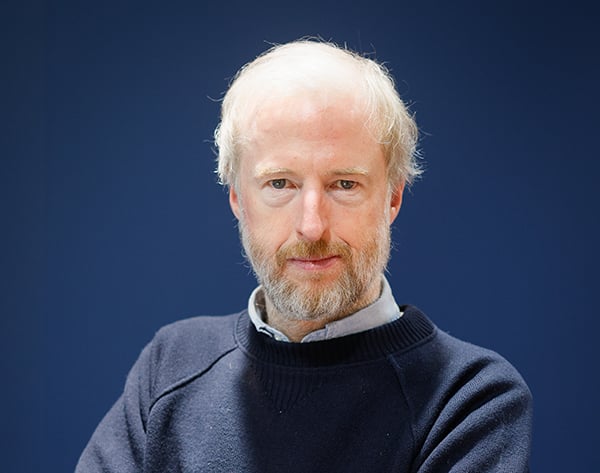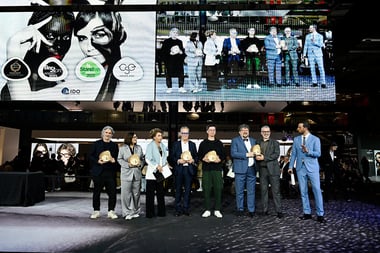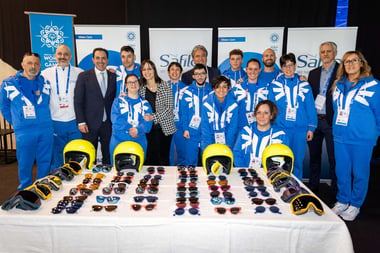
Winners of the CSE Award 2023: Modo Eyewear.
For some years now, MIDO has pursued the objectives of sustainability and company transparency. This commitment led to it being awarded ISO 20121:2012 certification, an international standard attesting to sustainable management of large events.
In fact, the Milan fair considers the reduction of environmental and social impact not only to be a simple necessity but a real duty; at the same time, MIDO also sees it as a duty to increase awareness by exhibitors, suppliers and visitors, sensitising and transforming them into sustainability ambassadors.
Among the activities introduced in this perspective, this year sees the arrival of the “zero” edition of the CSE AWARD - Certified Sustainable Eyewear 2023, an award created by MIDO in partnership with ANFAO and Certottica which assesses levels of sustainability in the international eyewear industry. An expert panel of judges evaluated the products that were entered in the contest, using specific criteria regarding their environmental and social impact and taking into account the entire life cycle of the product: recycling of materials, reduction of consumption in the manufacturing and distribution processes, enhancement of the supply chain, elimination of waste, level of recyclability, use of renewable energy sources, etc.
Six categories were judged: Sunglasses Europe, Sunglasses Rest of the World, Frames Europe, Frames Rest of the World, Cases Europe and Cases Rest of the World.
Today we meet the winner of the CSE Award Cases Europe: Modo Eyewear with Eco.
The spokesperson is Giovanni Lo Faro, CEO of the company.
Eco is blazing a trail in its commitment to sustainability: could you give us a brief history of the evolution of your brand?
Yes. When we started in 2009, the question of sustainability was not as compelling as it is today. Sustainable products are often seen by consumers as an intrinsic compromise, with higher prices or inferior quality. We were able from the very beginning to overcome this trade-off, offering a product which rivals that of non-sustainable competitors in terms of quality and price. As a company with decades of experience in eyewear design, we identified our priority as conceiving a product with a distinct and recognisable style, which is still for everyday use and marketable to a wide target group - a style that Vogue magazine has defined as “eco-chic”. We started with frames of 95% recycled metal and bio-based plastic from organic resources. Some years later, we launched our clip-on sunglasses to apply to eyewear, designing a system also for metal frames - a solution that won us various industry and design awards including the 2022 IF Design Award, as possibly the only brand in our sector offering items at affordable prices.
We have never given up our research into new materials and solutions, and so in the last few years we have introduced Eco Ocean, a collection made in plastic salvaged from the oceans and then recycled, and the Bio Acetato range, which has further increased our range, opening up a new premium-plus segment.
From a marketing point of view, with the assistance of expert consultants in the large-scale launch of sustainable products, we immediately believed in the policy of linking environmental action with the product. This action is implemented not only by ourselves and our supplier, but also by opticians and customers, all united in a high-impact team. In this case, we are united in a project to reduce CO2 emissions in the atmosphere - the “One Frame One Tree” project, thanks to which we have planted over 3 million trees.
Thus, today we have a product range backed by 13 years of experience in the sustainability field, with 4 different categories of sustainable materials, and a variety of all-round visual POP solutions for opticians, designed to be sustainable while maintaining a clear identity, and finally a large-scale product to improve the air that we breathe.
Your initiatives include “One Frame, One Tree”: can you tell us about this initiative and the latest news?
It’s a scheme where we plant one tree for every pair of glasses sold. So far, we have planted over 3.3 million trees, an extraordinary result which has allowed us to achieve the best possible result in our opinion - in fact, we can now declare that ECO is Carbon Negative! This means that “our” trees absorb more CO2 that we generate to produce our glasses; to put it briefly, Eco is a brand that gives back more to the environment than it takes away, and this is an achievement we are very proud of.
We are working with a specialised non-profit organisation in Africa, Cameroon, Tanzania and Senegal. We have been enthusiastic about this initiative from the start, because we have always dreamed of having a strong and tangible impact on the environment and also on the local communities (often underprivileged) by bringing food, work, education and independence.
One Frame, One Tree is also particularly important because it gives customers the chance to make their own contribution, to do something practical for the environment. And the philosophy of Eco is right there: everyone can make a difference through small individual choices, resulting in an enormous joint impact. In our opinion, this is more effective that aiming at revolutions that are not always realistic or relevant to the real lives of millions of people.
What does winning the CSE Award mean to you?
At first sight, it might seem less important, but after the awards for our eyewear, we are happy to win also for a glasses case! If we look at things from an environmental point of view, a case is just as important. This is why Eco has an all-round sustainability approach, from packaging to POP to shipping/supply chains. We are happy that this does not go unnoticed because we always talk about glasses but this is a huge and ongoing research effort for alternative solutions that our design office in Stockholm has carried out for years, achieving excellent results.
What are the technical and aesthetic characteristics of the CSE Award-winning glasses case?
Technically, our glasses are packaged in a bag made of cornstarch, then put inside this recycled PET case (just like the lens-cleaning cloth) and wrapped in a protective box of recycled paper, so there is no plastic or new resources involved. Specifically, the case and box are designed to optimise space for the supply/delivery chain. Just like our glasses, our packaging is both sustainable and aesthetically pleasing, exploiting every opportunity to drive home our message and company philosophy.



